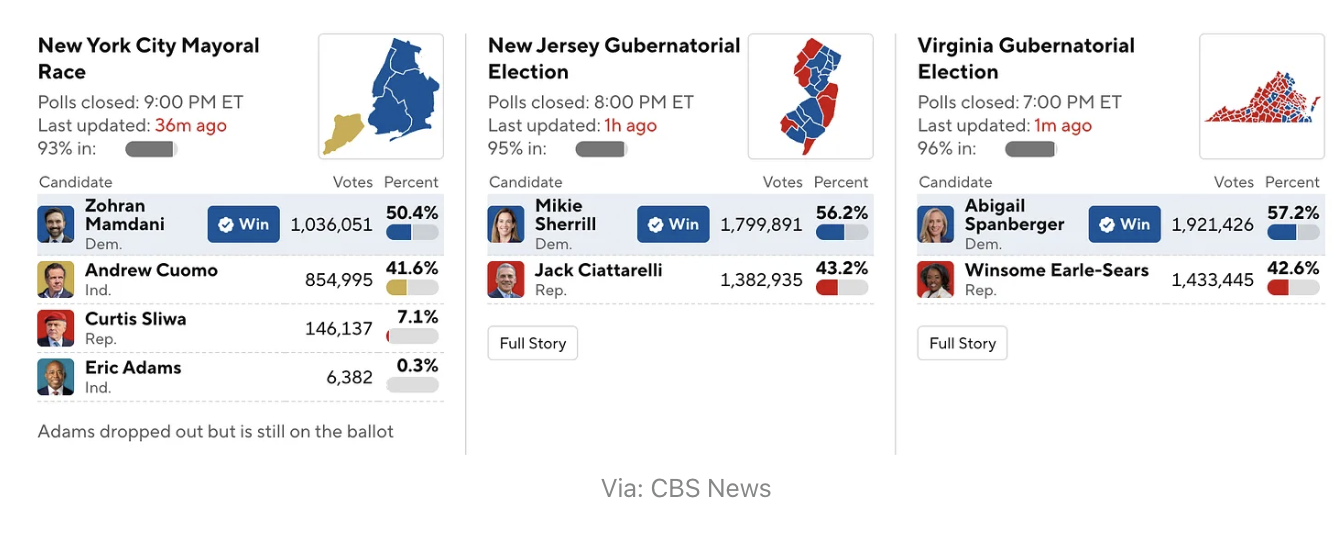Dems Sweep Election Night Races: What Does It Mean?
Democrats cleaned house Tuesday, winning governorships in Virginia and New Jersey, key statewide races in Pennsylvania and Georgia, and a major redistricting victory in California that could shape control of Congress next year.
But the night’s most dramatic result was in New York City, where Zohran Mamdani made history.
WHAT IT MEANS FOR NYC
The 34-year-old Democratic Socialist was elected mayor of New York City with more than 50% of roughly 2 million votes, defeating former Gov. Andrew Cuomo, who ran as an independent, and Republican Curtis Sliwa. Mamdani was polling at just 1% in February before winning the summer’s Democratic primary, building his campaign around tackling the city’s affordability crisis.
His message: “The working people of New York have been told by the wealthy and the well-connected that power does not belong in their hands,” he said from Brooklyn Tuesday night. “The future is in our hands.”
The exit polls: New Yorkers who voted for Mamdani tended to be younger, college-educated, middle-income, new to the city, and concerned about the cost of housing in the areas where they live. He energized tens of thousands of young volunteers and first-time voters. A majority of voters said his plans were unrealistic, but about 1 in 6 voters who said that still voted for him, NBC exit polling found.
What went wrong for Cuomo? The former NY governor told Mo News back in July that he “did not appeal to [voters] directly enough” during the primary and that he would fix that for the general election. It didn’t appear he changed much for take 2.
Cuomo just didn’t get voters excited and carried a lot of baggage due to, among other things, sexual harassment allegations against him and questions around his policies around COVID. Slightly more of his voters said their vote was actually against his opponents rather than for him.
What’s next? The question now is whether Mamdani governs the city with pragmatic moderation or embraces the extreme left wing of his party. During the campaign, he promised to freeze rents, create city-run grocery stores, and expand free childcare.
Mamdani said he will pay for that by raising income taxes on city residents who make more than $1 million a year. To do that, he’ll need support from moderate New York Gov. Kathy Hochul (D) — and she’s already rejected the idea (even though she endorsed him).
THE TRUMP FACTOR: Looming over the upcoming Mamdani administration is President Trump. He has called Mamdani “my little communist” and threatened to cut billions in federal funding to the city if Mamdani won.
It doesn’t look like this conflict is going anywhere. During his victory speech last night, Mamdani spoke directly to Trump, saying, “To get to any of us, you will have to get through all of us.”
Will the Democratic Socialist wave spread? Polling shows that 1 in 4 New Yorkers now consider themselves Democratic Socialists — something Mamdani underscored in his victory speech, quoting Eugene Debs, a socialist leader from the late 1800s/early 1900s who ran for president five times and inspired future left-wing movements.
👀 FIRST NEW YORK, THEN THE COUNTRY? Not necessarily. In New Jersey and Virginia, the vibe was different.
Moderate Democrats Abigail Spanberger and Mikie Sherrill won their respective gubernatorial races in Virginia and New Jersey. They both served in the U.S. House, and ran on platforms focused on economic growth/affordability.
“Virginia chose pragmatism over partisanship. We chose our Commonwealth over chaos,” Spanberger said. “You all chose leadership that will focus relentlessly on what matters most, lowering costs, keeping our communities safe and strengthening our economy for every Virginian.”
“We’re not going to give in to our darker impulses here in New Jersey,” Sherrill said after her win. “We know that this nation has not ever been, nor will it ever be ruled by kings” — poking at the anti-Trump “No Kings” rallies.
GOP RESPONSE: President Trump met with Republicans on Wednesday, and blamed the election losses in part on the government shutdown. He called on Senate Republicans to end the shutdown— now in its 36th day and the longest in U.S. history— by ending the filibuster or other measures. He said, “If you read the pollsters, the shutdown was a big factor — negative for the Republicans.”
Republican leaders have resisted the idea. The filibuster is a 60-vote threshold for major legislation to pass in the Senate, as opposed to a straight majority vote. Republicans warn that getting rid of the filibuster could backfire when Democrats regain power.
REDISTRICTING: California voters overwhelmingly approved Proposition 50, a measure allowing the legislature to draw new congressional maps expected to add up to five Democratic U.S. House seats ahead of the midterms.



